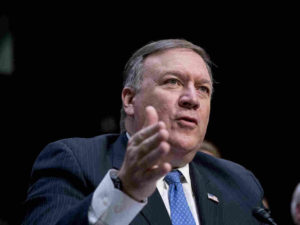May 26, 2018

In his first policy address as secretary of state, Mike Pompeo has delivered a confrontational speech on Iran packed with war whoops and challenges.
Pompeo threatened all-out confrontation with Iran unless it changed just about its entire conduct on the world stage.
He listed 12 demands (see list below) that he insisted be incorporated in a new agreement with Iran that would replace the nuclear deal President Obama negotiated.
Pompeo did not threaten to use military force if the demands were rejected, but he said that, if Iran resumes its enrichment program, “We will respond”—a limp formulation.
Among the demands, he insisted that Iran completely close its nuclear fuel cycle industry. He would allow Iran to keep its nuclear reactor at Bushehr generating electricity, but not to enrich any fuel for it or for the small research reactor in Tehran.
Pompeo also demanded that Iran provide full details on its past nuclear weapons program, which US intelligence says was largely closed in 2003 after its existence had been exposed. The Obama Administration originally demanded the same thing, but it dropped that demand when Iran agreed to severely restrict its enrichment program, concluding there was nothing to be gained by humiliating the Islamic Republic into admitting it had been lying for decades.
But Pompeo was not all stick. He also offered a carrot. After Iran agrees to the US demands, Pompeo said, “We’re prepared to end the principal components of every one of our sanctions against the regime.” He didn’t explain what he meant by “principal components” and why he didn’t just offer to end all sanctions.
Pompeo went on: “We’re happy at that point to re-establish full diplomatic and commercial relationships with Iran. And we’re prepared to admit Iran to have advanced technology. If Iran makes this fundamental strategic shift, we, too, are prepared to support modernization and reintegration of the Iranian economy into the international economic system.” It wasn’t clear if he understood that was not a benefit in the eyes of Iran’s hardliners.
Iran wasted no time in rejecting Pompeo’s laundry list of demands. Immediately after Pompeo’s speech, President Rohani shot back: “Who are you to decide for Iran and the world?” It was a reiteration of the charge of American arrogance and bullying. The Islamic Republic has long accused the US of arrogance and bullying. But since President Trump took office, the regime sees the charges having much more resonance than they did under Obama and has repeated the charge incessantly.
Much of Pompeo’s speech was an echo of Trump’s earlier speech taking the United States out of the nuclear deal. But as many analysts pointed out, all Trump did was back out of the deal. He failed to outline any new policy on Iran. That was what Pompeo did. But the demands were startlingly confrontational and appeared to many to be designed to be rejected and thereby to raise the level of confrontation by whole orders of magnitude.
Pompeo reiterated the standard Trump charges against Iran. But he added a new one: “Today, the Iranian Qods Force conducts covert assassination operations in the heart of Europe.” Iran has not been accused of carrying out an assassination in Europe this century, though a German court convicted an Iranian agent of gathering information on the movements of a Zionist that could have been used to support an assassination, and an Arab separatist from Ahvaz was shot dead in The Hague last November in circumstances that have rasied suspicions about Iran.
Pompeo also continued the US practice of emphasizing support for the Iranian people and distinguishing between the people and the regime. “We will also advocate tirelessly for the Iranian people,” Pompeo said. “The regime must improve how it treats its citizens. It must protect the human rights of every Iranian. It must cease wasting Iran’s wealth abroad.
“We ask that our international partners continue to add their voice to ours in condemning Iran’s treatment of its own citizens. The protests of the past few months show that the Iranian people are deeply frustrated with their own government’s failures.”
Later in his speech, he said: “Next year marks the 40th anniversary of the Islamic Revolution in Iran. At this milestone, we have to ask: What has the Iranian Revolution given to the Iranian people?
“The regime reaps a harvest of suffering and death in the Middle East at the expense of its own citizens. Iran’s economy is stagnant and without direction and about to get worse. Its young people are withering under the weight of frustrated ambitions. They are longing to pursue the freedoms and opportunities of the 21st Century.
“Iran’s leaders can change all of this if they choose to do so. Ali Khamenehi has been Supreme Leader since 1989. He will not live forever, nor will the Iranian people abide the rigid rules of tyrants forever. For two generations, the Iranian regime has exacted a heavy toll on its own people and the world. The hard grip of repression is all that millions of Iranians have ever known.
“Now is the time for the Supreme Leader and the Iranian regime to summon the courage to do something historically beneficial for its own people, for this ancient and proud nation,” Pompeo said.
A number of news outlets headlined that Pompeo pledged to “crush” Iran, and took that to mean that “regime change” was the policy. But Pompeo did not say that. He said the United States would crush Iranian agents operating around the Middle East.
Pompeo did say the United States would impose the “strongest sanctions in history.” He did not say what that meant. Since 1995, US sanctions have barred American residents from buying from, selling to and investing in Iran—fairly complete economic sanctions. Since Pompeo spoke, the Treasury Department has gone on a binge of issuing sanctions on Iranian individuals and businesses. But those are largely token sanctions that freeze any assets the named entities have in the United States.
